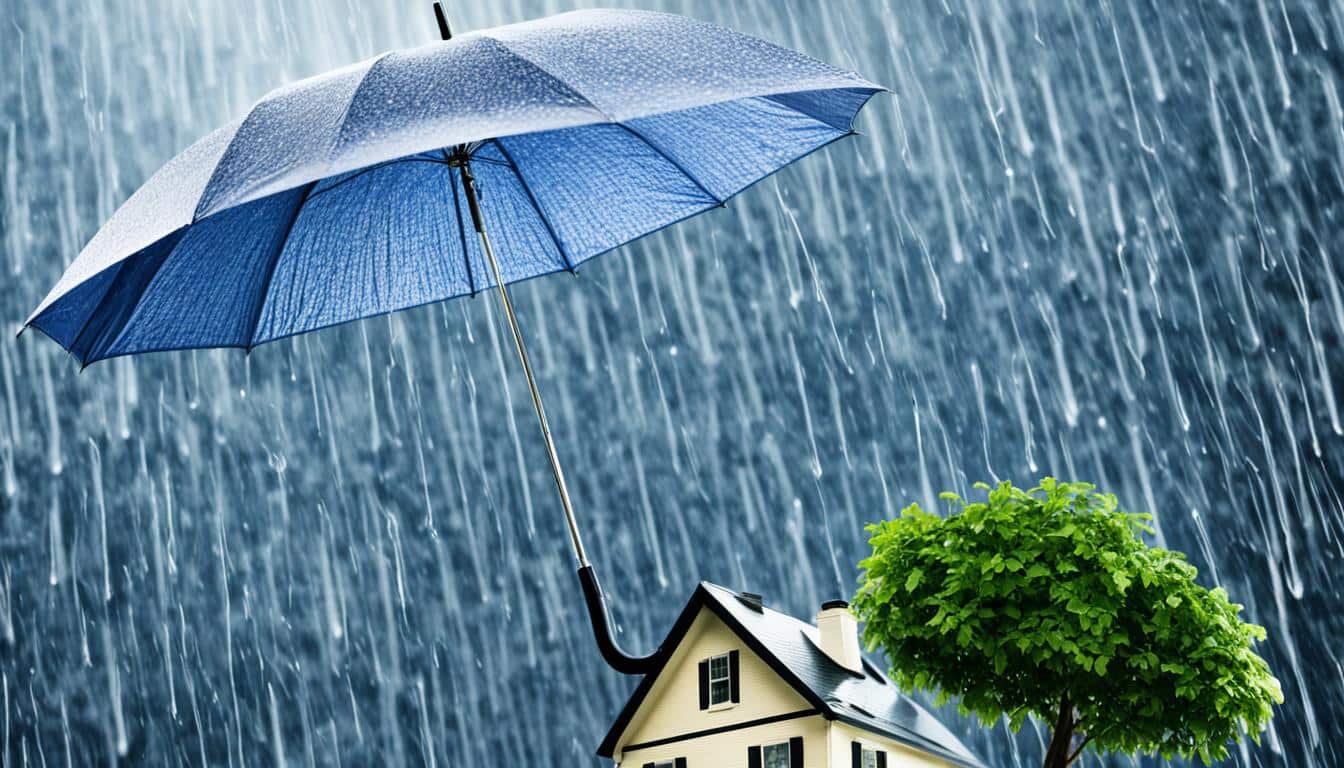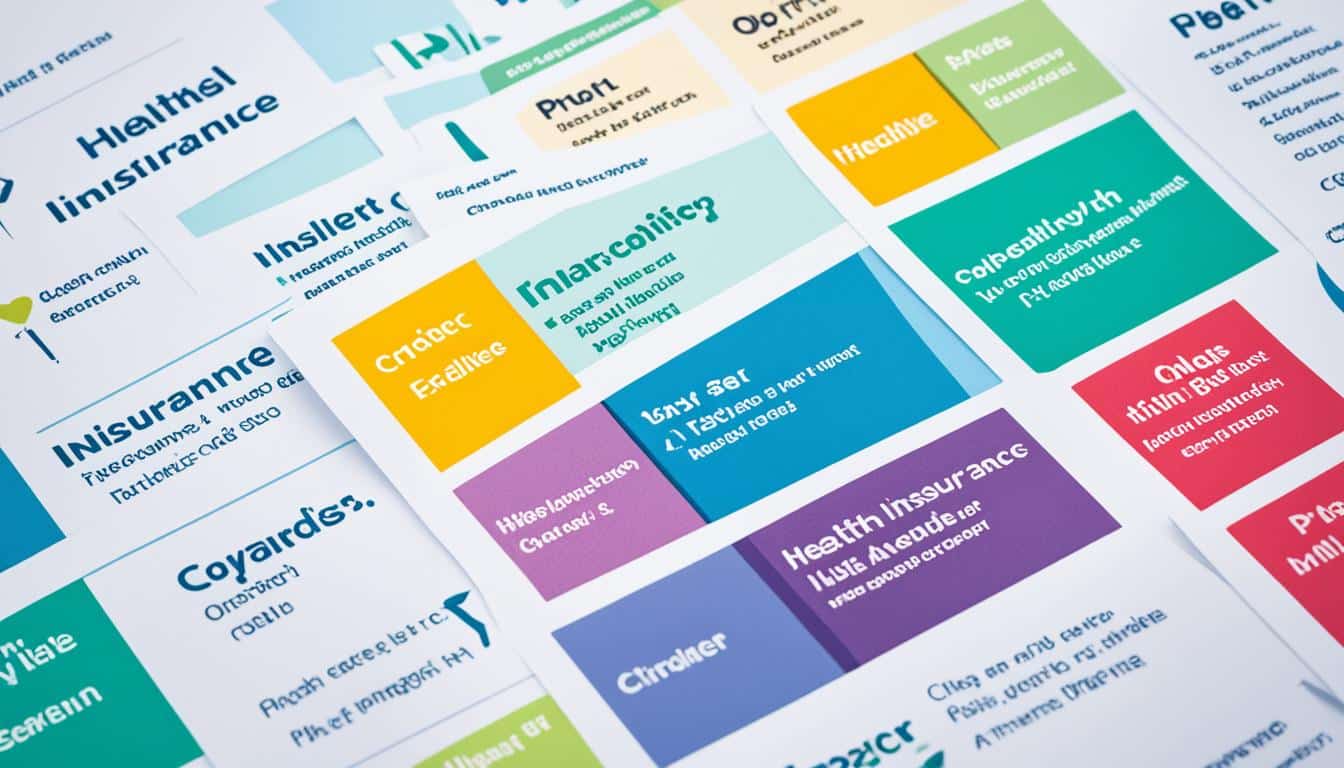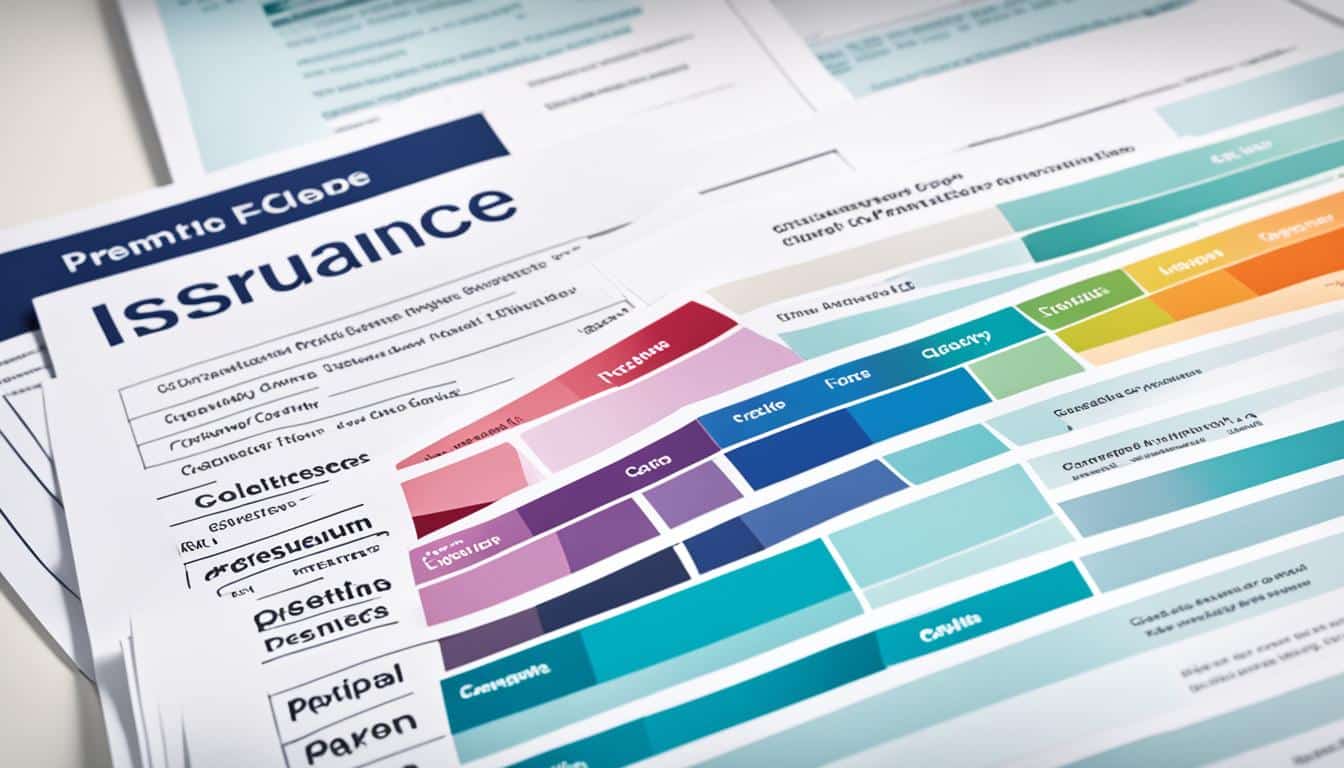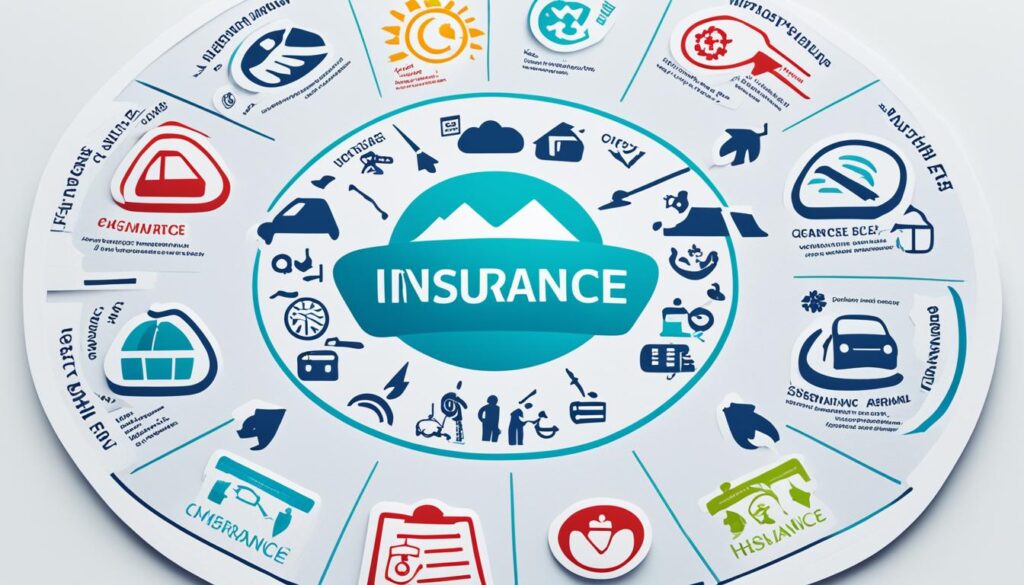Types Of Insurance is key to protecting you and your business from unexpected costs. It comes in many forms, each covering different risks. Knowing about these types helps you choose the right coverage for your needs.
Key Takeaways
- Insurance protects you from risks like car accidents, natural disasters, and medical emergencies.
- There are main types like auto, home, renters, life, health, umbrella, and business insurance.
- Auto insurance covers many things, including liability, accidents with uninsured drivers, and damage to your car.
- Home insurance shields your house, belongings, other buildings, and covers legal costs and extra living expenses.
- Life insurance offers term or permanent coverage, ensuring your loved ones are protected financially.
Auto Insurance
Auto insurance is a key financial safety net for drivers in the U.S. It’s required in almost every state. It covers various incidents, like accidents, theft, or natural disasters. Knowing the different types of auto insurance helps drivers pick the best policy for their needs and budget.
Also Read : How Does Space Technology Benefit Earth?
Liability Coverage
Liability coverage is a main part of auto insurance. It covers damages and injuries you cause to others if you’re at fault in an accident. This coverage has two parts: bodily injury and property damage liability. Each state sets a minimum liability limit, but drivers can increase it for more protection.
Also Read : How Does Neurotechnology Work?
Uninsured/Underinsured Motorist Coverage
This coverage protects you if hit by an uninsured or underinsured driver. It pays for your medical bills and lost wages if the other driver doesn’t have enough insurance.
Also Read : What Are The Most Popular University Degree?
Personal Injury Protection
Personal injury protection (PIP) covers medical costs and lost wages for you and your passengers, no matter who was at fault. It’s mandatory in some states and optional in others. It’s a valuable protection for you and your loved ones.
Also Read : How Can You Find Books In A University Library?
Medical Payment Coverage
Medical payment coverage, or MedPay, pays for medical bills for you and your passengers after an accident, regardless of fault. It’s useful when you have high deductibles or limited health insurance.
Also Read : What Are The Different Types Of Insurance Services?
Comprehensive and Collision Coverage
Comprehensive and collision coverage protect your car from accidents, theft, or natural disasters. Comprehensive covers damage not from a collision, like vandalism or hail. Collision covers repairs or replacement if your car hits another vehicle or object.
The right amount of auto insurance depends on your state’s laws, your car’s value, and your finances. It’s crucial to review your options and choose a policy that offers the best protection at a good price.
Home Insurance
Home insurance is key to protecting your home and its contents. It covers your dwelling, personal belongings, and liability as a homeowner or renter. Let’s look at the main parts of home insurance that give you peace of mind.
Dwelling Coverage
Dwelling coverage is the core of home insurance. It pays to fix or rebuild your home if it gets damaged by things like fire, wind, or theft. The amount you’re covered for is based on how much it would cost to build your home again. This ensures you can get your home back to its original state.
Personal Property Coverage
Your home is full of things you value. Personal property coverage protects your furniture, electronics, clothes, and more if they get stolen or damaged. This coverage is usually a part of your dwelling coverage, so the more your home is worth, the more your stuff is protected.
Other Structures on the Property
Things like a garage, shed, or fence are also covered by home insurance. Other structures coverage helps pay to fix or rebuild these if they get damaged by a covered event. You usually get 10% of your dwelling coverage for these structures.
Liability Coverage
If someone gets hurt on your property or you accidentally damage someone else’s property, you could be liable. Liability coverage in your policy pays for medical bills, legal fees, and damages if someone sues you.
Additional Living Expenses
If a covered event makes your home not liveable, additional living expenses coverage helps cover the cost of living somewhere else. This includes things like hotel stays and eating out. It makes sure you can keep your standard of living while your home is being fixed or rebuilt.
Most mortgage lenders require home insurance, and the coverage you need depends on your home and belongings’ value. Knowing these main parts can help you pick the right policy for your home.
| Home Insurance Coverage | What It Covers |
|---|---|
| Dwelling Coverage | Repair or rebuild your home after damage from a covered peril |
| Personal Property Coverage | Replacement of your personal belongings if stolen or destroyed |
| Other Structures Coverage | Repair or rebuild detached structures like a garage or shed |
| Liability Coverage | Injuries or property damage you accidentally cause to others |
| Additional Living Expenses | Reimbursement for extra costs if you have to temporarily live elsewhere |
Renters Insurance

As a renter, getting renters insurance is key to protect your stuff and your wallet. Your landlord’s insurance covers the building, but not your personal property. Renters insurance, also called tenant insurance or apartment insurance, is a budget-friendly way to keep your furniture, electronics, clothing, and other valuables safe from theft, fire, or natural disasters.
Renters insurance is great for personal property coverage. It helps replace your stuff if it gets damaged or stolen. Plus, it offers liability coverage. This means you’re protected if someone gets hurt or if you damage someone else’s property, saving you from big liability claims.
Things like a fire or natural disaster can make your place not liveable. Renters insurance can pay for temporary housing, food, and other must-haves while you’re finding a new place. It makes sure you have the support you need to bounce back.
“Renters insurance is an affordable and essential safeguard for anyone who doesn’t own their own home.”
Landlord insurance covers the building, but not your stuff as a tenant. Renters insurance is smart to protect your apartment, condo, or other rental property from surprises. It gives you the coverage you need to keep your lifestyle going.
Umbrella Insurance

Umbrella insurance is a key part of protecting your money. It adds an extra layer of liability coverage to your home, auto, or renters policies. This coverage helps protect your personal assets when your other insurance limits are reached. It covers costs from lawsuits and legal defense.
If you have a lot of wealth, umbrella insurance is crucial. Standard liability limits might not be enough if you face a big lawsuit. This insurance helps keep your assets safe and gives you peace of mind.
Umbrella insurance covers legal fees, court judgments, and settlements if you’re liable for someone else’s injury or damage. This excess liability coverage is very useful in serious accidents or lawsuits. It helps protect your assets from being at risk.
This insurance is also quite affordable. It’s much cheaper than the cost of a big lawsuit. Adding it to your insurance means you can relax, knowing your personal assets are safe from unexpected legal defense issues.
“Umbrella insurance is a must-have for anyone with significant personal assets or a high net worth. It provides an invaluable safety net that can give you the peace of mind you need to enjoy your life without worrying about potential legal liabilities.”
Life Insurance

Life insurance is key to protecting your loved ones. It ensures your family can keep their lifestyle going if you’re no longer there. It covers things like mortgage payments, debts, and final costs.
There are two main kinds of life insurance: term life insurance and permanent life insurance. Knowing the differences helps you pick the right one for your needs and goals.
Term Life Insurance
Term life insurance is easy to get and usually cheaper. It covers you for a set time, like 10 to 30 years. If you die during this time, it pays out a death benefit.
This kind of life insurance is great for people with short-term financial needs. It helps replace your income and protect your family during the policy term.
Permanent Life Insurance
Permanent life insurance includes whole life and universal life policies. It covers you for life and grows a cash value over time. You can use this cash value for things like retirement savings or final expenses.
This kind of life insurance is pricier than term life insurance. But it gives you more financial protection for your family and dependents.
Choosing the right life insurance depends on your needs, budget, and goals. Talking to an insurance expert can help you decide. They can explain the good and bad of each type and find the best coverage for your loved ones.
Health Insurance

Health insurance is key to covering the high costs of medical care. Many get it through work, the Health Insurance Marketplace, or by buying it directly. Knowing the types of health insurance can help you pick the best one for your needs and budget.
Employer-Sponsored Health Insurance
Many people get health insurance through their job. Employers often help pay for the insurance, making it cheaper for workers. These plans usually cover doctor visits, hospital stays, and prescription drugs.
Health Insurance Marketplace
The Health Insurance Marketplace lets people and families look for and compare private health insurance plans. If you earn less, you might get subsidies to lower your premiums and out-of-pocket costs.
Private Health Insurance
If you don’t get insurance from work or the Marketplace, you can buy it directly from an insurance company. Private plans come in different levels of coverage and can be tailored to your needs and budget.
High Deductible Health Plans
HDHPs have lower premiums but you pay more before coverage starts. They’re good for healthy people who want to save on insurance costs. But, they might not be best for those with frequent health issues.
| Health Insurance Type | Key Features |
|---|---|
| Employer-Sponsored | Subsidized premiums, wide range of benefits |
| Health Insurance Marketplace | Subsidies available, ability to compare plans |
| Private Health Insurance | Customizable coverage, direct from insurers |
| High Deductible Health Plans | Lower monthly premiums, higher out-of-pocket costs |
Choosing any type of health insurance is crucial to protect yourself from the high costs of medical bills and unexpected healthcare expenses.
Types Of Insurance Marketplace Plans

The health insurance marketplace has many plan options. Each plan has its own network and cost-sharing rules. Knowing the differences helps consumers pick the best plan for their health needs and budget.
Exclusive Provider Organization (EPO)
EPO plans cover care from in-network doctors and hospitals, except in emergencies. Members must use the plan’s network to get coverage. They can’t see out-of-network providers, except in emergencies.
Health Maintenance Organization (HMO)
HMO plans also limit coverage to their network, without needing referrals for specialists. Members choose a primary care physician who helps coordinate their care and gives referrals.
Point of Service (POS)
POS plans have lower costs for in-network care. Members can see out-of-network providers with a referral from their PCP. This gives more freedom than HMOs, but still requires a primary care physician’s coordination.
Preferred Provider Organization (PPO)
PPO plans let members use both in-network and out-of-network care. But, they pay more for out-of-network care, including higher copays and coinsurance.
These plans come in different metal coverage levels (bronze, silver, gold, platinum). Bronze plans have low premiums but high deductibles and costs. Platinum plans have high premiums but low out-of-pocket expenses.
| Plan Type | Provider Network | Referrals Required | Out-of-Network Coverage |
|---|---|---|---|
| Exclusive Provider Organization (EPO) | In-network only | No | Emergency only |
| Health Maintenance Organization (HMO) | In-network only | Yes | No |
| Point of Service (POS) | Lower cost in-network | Yes | With referral |
| Preferred Provider Organization (PPO) | In-network and out-of-network | No | Yes, higher costs |
Business Insurance

Businesses of all sizes face risks like lawsuits, accidents, and natural disasters. To protect their company, entrepreneurs and small business owners need business insurance. This insurance covers a range of threats, helping the business stay successful.
General liability insurance is key for businesses. It protects against claims of injuries or damage to others’ property. Commercial property insurance covers damage to the business’s buildings, equipment, and inventory.
Workers’ compensation insurance is vital for businesses with employees. It pays for medical bills and lost wages if workers get hurt on the job. Professional liability insurance, or errors and omissions (E&O) insurance, covers claims of mistakes in the services offered.
In today’s digital world, cyber liability insurance is crucial for businesses. It helps cover costs from data breaches and cyber attacks. Commercial auto insurance protects company vehicles and drivers, ensuring they follow the law and protecting the business from liability in accidents.
The business insurance needs vary by business size, industry, and risks. By choosing the right coverage, entrepreneurs and small business owners can protect their company’s future. This lets them focus on growth and success.
“Protecting your business with the right insurance coverage is crucial for long-term success and stability.”
Specialty Insurance

There are many specialty insurance options for unique risks and assets. These policies give individuals and businesses tailored coverage for their needs. They add an extra layer of protection beyond standard insurance plans.
Boat and Marine Insurance
Boat and marine insurance covers boats, yachts, and personal watercraft. It protects against damage, theft, and liability. This specialty insurance is key for boat owners. It helps them protect their investment and enjoy the water without worry.
Crop Insurance
Crop insurance helps farmers and ranchers with losses from natural disasters and bad weather. It’s a vital tool for farming and agriculture. It ensures stability and security against natural catastrophes.
Natural Disaster Insurance
Natural disaster insurance covers homes and businesses in high-risk areas. It offers peace of mind and financial security for those in danger zones. This specialty insurance is crucial for those facing natural disasters.
Pet Insurance
Pet insurance covers vet bills for pets. As pets become more like family, this specialty insurance helps owners pay for medical care. It ensures pets get the care they need without financial stress.
Travel Insurance
Travel insurance covers trip cancellations, interruptions, and medical emergencies. It’s for individuals and families on vacations. This specialty insurance offers coverage options for unexpected issues while traveling.
These specialty insurance options give tailored coverage for specific risks and assets. They ensure comprehensive risk management and peace of mind for individuals and businesses.
Also Read : How Do I Get Affordable Dental Insurance?
Conclusion
Today, there are many insurance types that help protect individuals, families, and businesses from various risks. You can get coverages like auto, home, life, and health insurance. There are also more specific options like umbrella, business, and specialty insurance.
When looking for insurance, think about what you need and the risks you face. Working with licensed agents and brokers can help you find the right protection. It’s important to know about the different insurance options and how they work for your financial planning and risk management.
Exploring the many insurance types and insurance options helps you make smart choices for your coverage needs and financial protection. Having the right insurance policies for risk management gives you peace of mind. This is true for individuals, families, or businesses. The process of insurance shopping and insurance education is key to your financial health and stability.
FAQs
Q: What Are the Different Types of Insurance?
A: There are several types of insurance policies available to individuals and businesses, including long-term care insurance, homeowners insurance, car insurance, disability insurance, and life insurance policies. Each type of policy offers different coverage options and benefits.
Q: How Does Insurance Help Individuals and Businesses?
A: Insurance provides coverage in the event of unexpected circumstances, such as accidents, natural disasters, or illnesses. It helps individuals and businesses manage financial risks by transferring the cost of potential losses to the insurance company.
Q: What Are the Common Types of Insurance Policies and Coverage You Need?
A: Common types of insurance include liability insurance, which protects individuals and businesses from claims related to property damage or injuries; car insurance, which covers damages in the event of a car accident; and homeowners insurance, which provides coverage for damages to a home or personal property.
Q: What Are the 7 Types of Insurance You Need?
A: The 7 types of insurance that individuals may need include health insurance, life insurance, disability insurance, homeowners insurance, car insurance, liability insurance, and long-term care insurance. These coverages help protect against various risks and provide financial security.
Q: What Is Variable Life Insurance?
A: Variable life insurance is a type of permanent life insurance that allows policyholders to allocate a portion of their premiums to investment options, such as stocks and bonds. The cash value of the policy can fluctuate based on the performance of the investments.
Q: How Do Insurance Policies and Coverage Work?
A: Insurance policies outline the terms and conditions of coverage, including the types of risks covered, the amount of coverage provided, and the premiums to be paid. When a covered event occurs, the insurance pays out a specified amount to help cover the associated costs.
Q: Why Is Dental and Vision Insurance Important?
A: Dental and vision insurance provide coverage for routine dental care, eye exams, and vision correction expenses. These types of insurance can help individuals manage the costs of maintaining good oral and eye health, which are essential for overall well-being.


